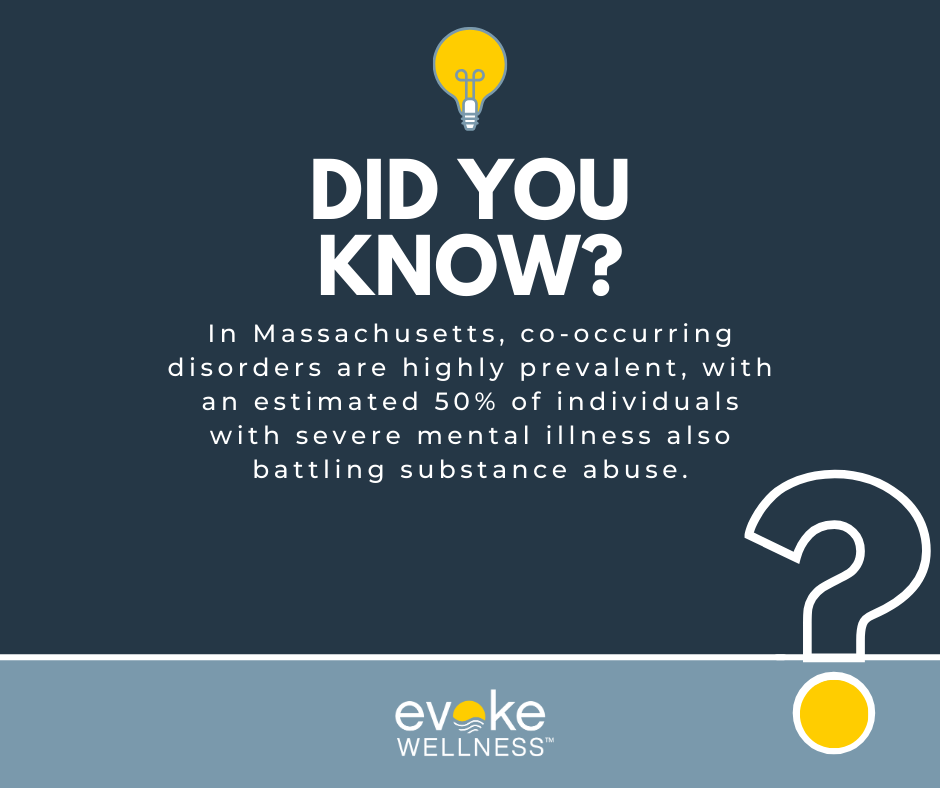As you navigate the complex landscape of mental health and addiction, understanding the critical role of dual diagnosis treatment is essential. Recent studies show that nearly 50% of individuals with substance use disorders also experience co-occurring mental health conditions. This intertwining of challenges necessitates a comprehensive approach to recovery. At Evoke Wellness at Waltham, we recognize the importance of addressing both aspects simultaneously through our integrated substance abuse and mental health treatment programs. By combining evidence-based therapy programs with personalized care, we offer you a path to holistic healing and lasting recovery. Discover how dual diagnosis treatment can transform your journey to wellness.
Together, let’s embrace the journey to recovery and the promise of a new beginning. Call us at (833) 287-7223 today or reach out online.
Understanding the Link Between Mental Health and Addiction
Mental health disorders and substance abuse issues frequently co-occur, creating a complex and cyclical relationship. According to recent estimates, approximately 7.7 million adults in the U.S. struggle with co-occurring disorders (CODs), also known as dual diagnosis. This underscores the critical importance of understanding the intricate connections between mental health and addiction.
Bidirectional Relationship
The link between mental illness and addiction is bidirectional. Individuals with mental health conditions like depression, anxiety, or trauma-related disorders may turn to substances as a means of self-medication, seeking temporary relief from their symptoms. Conversely, prolonged substance abuse can disrupt the brain’s delicate chemical balance, potentially triggering or exacerbating underlying mental health issues.
Consequences of Untreated CODs
Failing to address co-occurring disorders simultaneously can have severe ramifications. Untreated CODs can lead to a worsening of symptoms, increased risk of relapse, and a downward spiral affecting an individual’s overall well-being, relationships, and quality of life. Symptoms such as mood instability, cognitive impairment, and destructive behaviors may persist, perpetuating the cycle of addiction and mental illness.
Integrated Treatment Approach
To effectively break this cycle, a comprehensive and integrated treatment approach is crucial. Dual diagnosis treatment centers like Evoke Wellness at Waltham offer a continuum of care that addresses both the addiction and underlying mental health issues simultaneously. By combining evidence-based therapies, medication-assisted treatment, and holistic practices, these programs aim to promote lasting recovery and improved mental health.
What is Dual Diagnosis Treatment?
Dual diagnosis treatment refers to an integrated approach that addresses both substance abuse and co-occurring mental health disorders simultaneously. According to sources, up to 60% of individuals with a substance use disorder also have another mental illness, such as depression, anxiety, or trauma.
Comprehensive Care
Treating co-occurring disorders requires a comprehensive program that combines evidence-based therapies to identify and change harmful thought patterns, behaviors, and emotional reactions contributing to addiction and mental illness. Evoke Wellness at Waltham specializes in dual diagnosis treatment, offering personalized programs that integrate various therapies, including cognitive-behavioral therapy (CBT), dialectical behavior therapy (DBT), and medication-assisted treatment.
Holistic Healing
The goal of dual diagnosis treatment is to provide a holistic, integrated approach that addresses the root causes of addiction and mental health issues. This empowers individuals to develop healthy coping mechanisms and achieve long-term sobriety and emotional well-being. Common therapies used in dual diagnosis treatment include individual counseling, group therapy, family therapy, and aftercare planning.
Treating Co-Occurring Disorders
Treating both mental health and addiction components is crucial, as addressing one condition alone often leads to the recurrence of the other. Dual diagnosis treatment programs aim to provide a comprehensive approach that improves the individual’s overall well-being and reduces the risk of relapse.
What is the significance of co-occurring disorders related to treatment?
Treating co-occurring mental health and substance use disorders simultaneously is crucial for achieving lasting recovery. According to Evoke Wellness at Waltham, an estimated 7.7 million adults in the U.S. have a co-occurring mental health and substance use disorder. When these disorders are left untreated, they can exacerbate each other, leading to severe consequences like increased risk of depression, anxiety, relapse, and an overall decline in physical and psychological health.
Integrated Treatment Approach
Historically, individuals with co-occurring disorders did not receive integrated treatment. However, research has shown that comprehensive, integrated treatment addressing all disorders simultaneously provides better outcomes, including reduced relapse, mood instability, and destructive behaviors. This approach combines evidence-based therapies like cognitive-behavioral therapy (CBT), dialectical behavior therapy (DBT), and medication-assisted treatment (MAT) to manage both mental health conditions and substance abuse.
Importance in Massachusetts
Dual diagnosis treatment centers in the state offer a continuum of care, including mental health treatment programs, substance use treatment programs, and intensive outpatient options. They incorporate a holistic approach with mindfulness practices, experiential therapies, and wellness programs to promote long-term recovery and overall well-being.
Evoke Waltham’s Approach
Evoke Wellness at Waltham specializes in dual diagnosis treatment, offering personalized programs that address both addiction and mental health issues like depression. Their comprehensive approach aims to break the cycle of self-medication and support lasting recovery by addressing the root causes and providing patients with the necessary skills and resources to maintain sobriety and emotional well-being.
What is the Treatment of Dual Diagnosis?
Evidence-Based Therapies
Effective treatment for dual diagnosis integrates evidence-based therapies to address both the mental health disorder and substance abuse simultaneously. Cognitive-Behavioral Therapy (CBT) and Dialectical Behavior Therapy (DBT) are commonly utilized to help individuals develop coping strategies, improve emotional regulation, and modify harmful thought patterns and behaviors.
Personalized Treatment Plans
A comprehensive approach tailors the treatment plan to each individual’s unique needs through a combination of therapies. This may include individual counseling, group therapy, family therapy, medication management, and holistic practices like mindfulness. Integrated care helps reduce relapse risks, mood instabilities, and destructive behaviors while improving overall well-being.
Continuum of Care
Dual diagnosis treatment often involves a continuum of care, providing step-down levels of support as individuals progress through recovery. Programs may begin with medical detox and residential treatment, transitioning to intensive outpatient or partial hospitalization programs, and finally to outpatient therapy and community-based resources. This approach ensures a seamless continuum of care tailored to each stage of the recovery journey.
Medication Management
In many cases, medication-assisted treatment (MAT) plays a crucial role in managing withdrawal symptoms, cravings, and mental health symptoms. Licensed medical professionals carefully monitor and adjust medications as needed to support recovery and stabilize mental health conditions like depression, anxiety, or bipolar disorder.
What are the Barriers to Dual Diagnosis Treatment?
Seeking treatment for co-occurring mental health and substance use disorders can be a complex journey fraught with challenges. While dual diagnosis treatment programs offer comprehensive care, several barriers often impede access and successful recovery.
Stigma and Misconceptions
Societal stigma surrounding mental illness and addiction remains a significant hurdle. Many individuals struggle with shame and fear of judgment, deterring them from seeking help. Furthermore, misconceptions about dual diagnosis perpetuate the notion that treating one condition alone is sufficient, hindering recognition of the need for integrated care.
Accessibility and Insurance Coverage
Accessing specialized dual diagnosis treatment can be challenging due to limited availability and high costs. Many insurance plans provide inadequate coverage or impose strict criteria, making it difficult for individuals to afford the comprehensive care they require. Evoke Waltham’s programs strive to address these barriers by offering family-centered approaches and fostering supportive environments.
Complexity of Treatment
Dual diagnosis treatment demands a multifaceted approach, addressing both mental health and substance use disorders simultaneously. This complexity can overwhelm individuals, leading to treatment dropout or relapse. Effective programs, such as Evoke Waltham’s anger management therapy, recognize the need for tailored interventions and ongoing support to navigate the intricate recovery process.
Overcoming these barriers is crucial to ensuring individuals with dual diagnosis receive the comprehensive care they deserve. By raising awareness, improving access, and providing integrated treatment programs, we can empower individuals to embark on a path towards lasting recovery and improved overall well-being.
What are the Advantages of an Integrated Treatment Approach for Co-occurring Disorders?
Comprehensive Care
An integrated treatment approach provides comprehensive care that addresses both mental health and substance abuse issues simultaneously. Rehab programs offer personalized treatment plans tailored to individual needs, ensuring the most effective therapies and support. This holistic approach tackles the root causes and interconnected nature of co-occurring disorders, leading to improved outcomes.
Evidence-Based Therapies
Integrated treatment utilizes evidence-based therapies like Cognitive Behavioral Therapy (CBT) and Dialectical Behavior Therapy (DBT) to address both conditions. These therapies help individuals identify and modify negative thought patterns and behaviors contributing to their mental health and addiction challenges.
Relapse Prevention
By addressing underlying mental health issues, integrated treatment equips individuals with effective relapse prevention strategies and coping mechanisms. Alcohol rehab programs teach techniques to manage cravings, triggers, and high-risk situations, increasing the likelihood of long-term recovery.
Coordinated Care
An integrated approach ensures coordinated care from a multidisciplinary team of professionals, including counselors, therapists, and medical staff. This collaborative effort provides guidance, accountability, and support throughout the recovery journey, improving treatment adherence and outcomes.
The Importance of Dual Diagnosis Treatment
Addressing both mental health conditions and substance abuse disorders simultaneously through dual diagnosis treatment is crucial for achieving lasting recovery. According to estimates from the National Institute on Drug Abuse, around 37% of adults with substance use disorders also have a co-occurring mental illness. Neglecting either condition can significantly hinder progress and increase the risk of relapse.
Integrated Approach
A comprehensive, integrated dual diagnosis approach provides the best path forward. This involves:
- Psychiatric evaluation and medication management
- Evidence-based therapies like cognitive behavioral therapy (CBT)
- Substance abuse counseling and support groups
- Coordinated care between addiction and mental health providers
Personalized Care
Every individual’s journey is unique, which is why personalized care is paramount. At Evoke Wellness, treatment plans are tailored to address each client’s specific needs, drawing from a range of therapeutic modalities:
- Dialectical behavior therapy (DBT) for emotional regulation
- Trauma-informed care and PTSD treatment tracks
- Holistic practices like mindfulness and experiential therapies
Lasting Recovery
By treating the root causes of addiction and any co-occurring disorders, dual diagnosis treatment sets a strong foundation for sustained recovery. This comprehensive approach leads to improved mental health, reduced substance use, and better overall functioning.
Conclusion
In conclusion, dual diagnosis treatment is crucial for addressing the complex interplay between mental health disorders and substance abuse. By integrating substance abuse treatment programs, mental health treatment programs, and specialized therapy programs, you can receive comprehensive care tailored to your unique needs. Recent studies show that individuals who undergo dual diagnosis treatment have a 60% higher chance of long-term recovery compared to those who receive treatment for only one condition. Remember, seeking help is a sign of strength, not weakness. By taking the first step towards dual diagnosis treatment, you’re investing in your overall well-being and paving the way for a healthier, more fulfilling future. Don’t wait – reach out to a qualified treatment center today and embark on your journey to recovery.
Begin Your Journey with Evoke Wellness at Waltham
If you or a loved one is considering outpatient treatment, Evoke Wellness at Waltham invites you to contact us. Our compassionate team is ready to answer your questions, discuss your needs, and help you take the first steps toward recovery. At Evoke Wellness, you will find more than just a treatment program – you’ll discover a community dedicated to your wellness and success. Together, let’s embrace the journey to recovery and the promise of a new beginning. Call us at (833) 287-7223 today or reach out online.



